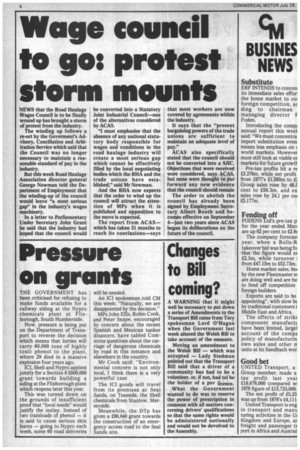Wage council to go: protest storm mounts
Page 6

If you've noticed an error in this article please click here to report it so we can fix it.
NEWS that the Road Haulage Wages Council is to be finally wound up has brought a storm of protest from the industry.
The winding up follows a re-ort by the Goverment's Advisory, Conciliation and Arbitration Service which said that the Council was no longer necessary to maintain a reasonable standard of pay in the industry.
But this week Road Haulage Association director general George Newman told the Department of Employment that the winding-up of the council would leave "a most serious gap" in the industry's wages machinery.
In a letter to Parliamentary Under Secretary John Grant he said that the industry had hoped that the council would be converted into a Statutory Joint Industrial Council—one of the alternatives considered by ACAS.
"I must emphasise that the absence of any national statutory body responsible for wages and conditions in the road haulage industry will create a most serious gap which cannot be effectively filled by the local negotiating bodies which the RHA and the trade unions have established," said Mr Newman.
And the RHA now expects that the order to wind up the council will attract the attention of MPs when it is published and opposition to the move is expected.
The report from ACAS— which has taken 31 months to reach its conclusions—says that most workers are now covered by agreements within the industry.
It says that the "present bargaining powers of the trade unions are sufficient to maintain an adequate level of pay."
ACAS also specifically stated that the council should not be converted into a SJIC. Objections that were received were considered, says ACAS, but none were thought to put forward any new evidence that the council should remain The order to abolish the council has already been signed by Employment Secretary Albert Booth and becomes effective on September 4—just two years since ACAS began its deliberations on the future of the council.




























































































